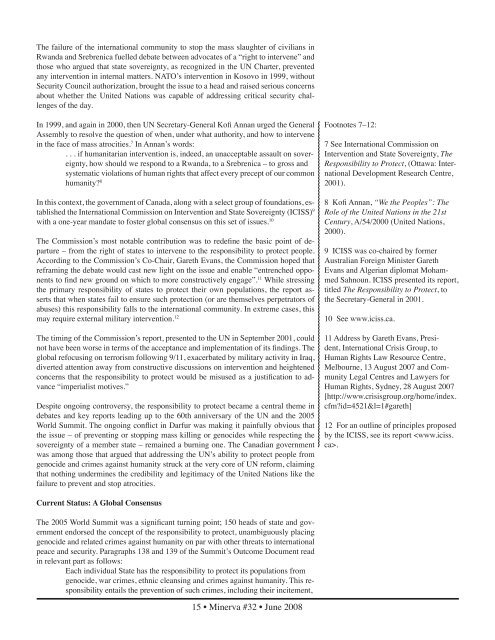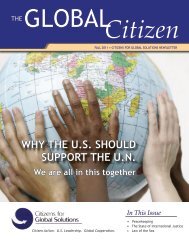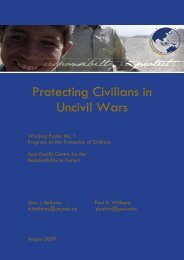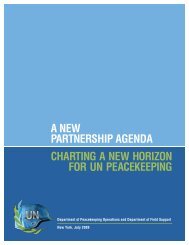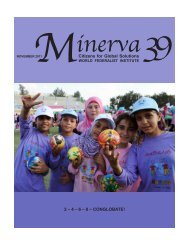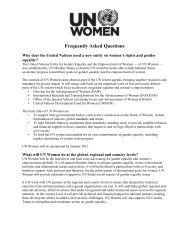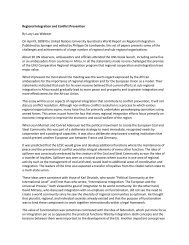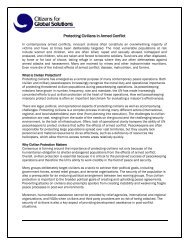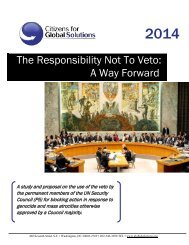Minerva, Spring 2008 (Volume 32) - Citizens for Global Solutions
Minerva, Spring 2008 (Volume 32) - Citizens for Global Solutions
Minerva, Spring 2008 (Volume 32) - Citizens for Global Solutions
Create successful ePaper yourself
Turn your PDF publications into a flip-book with our unique Google optimized e-Paper software.
The failure of the international community to stop the mass slaughter of civilians in<br />
Rwanda and Srebrenica fuelled debate between advocates of a “right to intervene” and<br />
those who argued that state sovereignty, as recognized in the UN Charter, prevented<br />
any intervention in internal matters. NATO’s intervention in Kosovo in 1999, without<br />
Security Council authorization, brought the issue to a head and raised serious concerns<br />
about whether the United Nations was capable of addressing critical security challenges<br />
of the day.<br />
In 1999, and again in 2000, then UN Secretary-General Kofi Annan urged the General<br />
Assembly to resolve the question of when, under what authority, and how to intervene<br />
in the face of mass atrocities. 7 In Annan’s words:<br />
. . . if humanitarian intervention is, indeed, an unacceptable assault on sovereignty,<br />
how should we respond to a Rwanda, to a Srebrenica – to gross and<br />
systematic violations of human rights that affect every precept of our common<br />
humanity? 8<br />
In this context, the government of Canada, along with a select group of foundations, established<br />
the International Commission on Intervention and State Sovereignty (ICISS) 9<br />
with a one-year mandate to foster global consensus on this set of issues. 10<br />
The Commission’s most notable contribution was to redefine the basic point of departure<br />
– from the right of states to intervene to the responsibility to protect people.<br />
According to the Commission’s Co-Chair, Gareth Evans, the Commission hoped that<br />
reframing the debate would cast new light on the issue and enable “entrenched opponents<br />
to find new ground on which to more constructively engage”. 11 While stressing<br />
the primary responsibility of states to protect their own populations, the report asserts<br />
that when states fail to ensure such protection (or are themselves perpetrators of<br />
abuses) this responsibility falls to the international community. In extreme cases, this<br />
may require external military intervention. 12<br />
The timing of the Commission’s report, presented to the UN in September 2001, could<br />
not have been worse in terms of the acceptance and implementation of its findings. The<br />
global refocusing on terrorism following 9/11, exacerbated by military activity in Iraq,<br />
diverted attention away from constructive discussions on intervention and heightened<br />
concerns that the responsibility to protect would be misused as a justification to advance<br />
“imperialist motives.”<br />
Despite ongoing controversy, the responsibility to protect became a central theme in<br />
debates and key reports leading up to the 60th anniversary of the UN and the 2005<br />
World Summit. The ongoing conflict in Darfur was making it painfully obvious that<br />
the issue – of preventing or stopping mass killing or genocides while respecting the<br />
sovereignty of a member state – remained a burning one. The Canadian government<br />
was among those that argued that addressing the UN’s ability to protect people from<br />
genocide and crimes against humanity struck at the very core of UN re<strong>for</strong>m, claiming<br />
that nothing undermines the credibility and legitimacy of the United Nations like the<br />
failure to prevent and stop atrocities.<br />
Footnotes 7–12:<br />
7 See International Commission on<br />
Intervention and State Sovereignty, The<br />
Responsibility to Protect, (Ottawa: International<br />
Development Research Centre,<br />
2001).<br />
8 Kofi Annan, “We the Peoples”: The<br />
Role of the United Nations in the 21st<br />
Century, A/54/2000 (United Nations,<br />
2000).<br />
9 ICISS was co-chaired by <strong>for</strong>mer<br />
Australian Foreign Minister Gareth<br />
Evans and Algerian diplomat Mohammed<br />
Sahnoun. ICISS presented its report,<br />
titled The Responsibility to Protect, to<br />
the Secretary-General in 2001.<br />
10 See www.iciss.ca.<br />
11 Address by Gareth Evans, President,<br />
International Crisis Group, to<br />
Human Rights Law Resource Centre,<br />
Melbourne, 13 August 2007 and Community<br />
Legal Centres and Lawyers <strong>for</strong><br />
Human Rights, Sydney, 28 August 2007<br />
[http://www.crisisgroup.org/home/index.<br />
cfm?id=4521&l=1#gareth]<br />
12 For an outline of principles proposed<br />
by the ICISS, see its report .<br />
Current Status: A <strong>Global</strong> Consensus<br />
The 2005 World Summit was a significant turning point; 150 heads of state and government<br />
endorsed the concept of the responsibility to protect, unambiguously placing<br />
genocide and related crimes against humanity on par with other threats to international<br />
peace and security. Paragraphs 138 and 139 of the Summit’s Outcome Document read<br />
in relevant part as follows:<br />
Each individual State has the responsibility to protect its populations from<br />
genocide, war crimes, ethnic cleansing and crimes against humanity. This responsibility<br />
entails the prevention of such crimes, including their incitement,<br />
15 • <strong>Minerva</strong> #<strong>32</strong> • June <strong>2008</strong>


